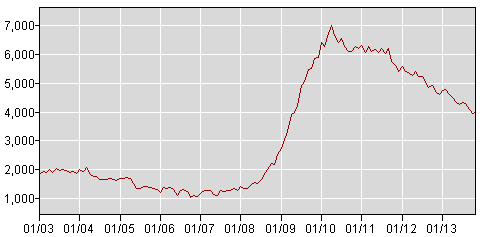
Source: Bureau of Labor Statistics
Nearly 10.3 million Americans were unemployed in November, and almost 4 million of them, or 38.8% of all unemployed, have been out of work for 27 weeks or more. (December unemployment figures are due out Friday morning.)
The number of Americans who have remained unemployed for more than 26 weeks soared during and after the Great Recession, peaking at 6.7 million people — 48.1% of total unemployed — in April 2010. (All figures used here are unadjusted for seasonal variations.) While long-term unemployment has fallen slowly since then, it remains well above pre-recession norms, both in absolute and percentage terms: The averages in 2008 were 1.76 million and 19.7%, respectively.
The federal-state unemployment insurance system typically pays benefits for up to 26 weeks. But during periods of high unemployment Congress can, and often does, fund “emergency unemployment compensation” programs for a set time. Congress did so in June 2008, as the recession gathered steam. After several expansions and extensions, up to 47 extra weeks of unemployment benefits were available, depending on each state’s jobless rate.
However, Congress did not include an emergency-benefits extension in last month’s budget deal between the Democratic-run Senate and the Republican-controlled House. As a result, the program expired on Jan. 1 and an estimated 1.3 million out-of-work people who had been receiving emergency benefits have lost them.
President Obama has called on Congress to extend the emergency-benefits program for another three months; Senate Majority Leader Harry Reid has scheduled a vote tonight on a measure to do that. Some Republicans, including House Speaker John Boehner, have said they’re open to renewing the benefits as long as the cost can be offset, but other GOP leaders oppose any extension.



